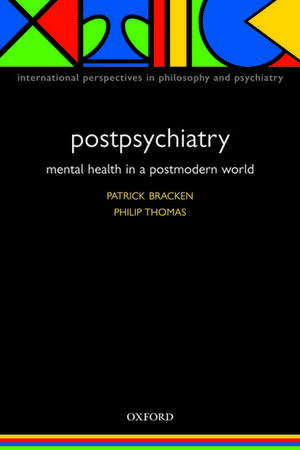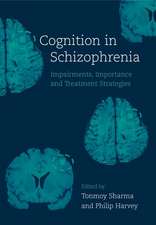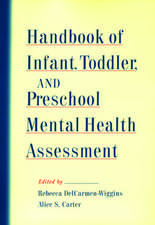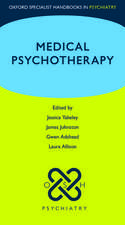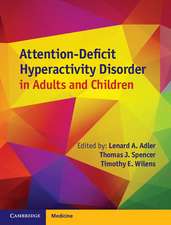Postpsychiatry: Mental health in a postmodern world: International Perspectives in Philosophy & Psychiatry
Autor Patrick Bracken, Philip Thomasen Limba Engleză Paperback – 22 dec 2005
Din seria International Perspectives in Philosophy & Psychiatry
- 5%
 Preț: 552.58 lei
Preț: 552.58 lei - 13%
 Preț: 322.49 lei
Preț: 322.49 lei - 24%
 Preț: 541.08 lei
Preț: 541.08 lei - 23%
 Preț: 476.22 lei
Preț: 476.22 lei - 23%
 Preț: 543.69 lei
Preț: 543.69 lei - 23%
 Preț: 498.95 lei
Preț: 498.95 lei - 23%
 Preț: 544.39 lei
Preț: 544.39 lei - 24%
 Preț: 471.81 lei
Preț: 471.81 lei - 23%
 Preț: 413.41 lei
Preț: 413.41 lei - 23%
 Preț: 475.08 lei
Preț: 475.08 lei - 18%
 Preț: 364.04 lei
Preț: 364.04 lei - 18%
 Preț: 516.69 lei
Preț: 516.69 lei - 24%
 Preț: 458.13 lei
Preț: 458.13 lei - 23%
 Preț: 375.59 lei
Preț: 375.59 lei - 14%
 Preț: 327.50 lei
Preț: 327.50 lei - 27%
 Preț: 566.67 lei
Preț: 566.67 lei - 23%
 Preț: 465.20 lei
Preț: 465.20 lei - 28%
 Preț: 481.03 lei
Preț: 481.03 lei - 23%
 Preț: 383.99 lei
Preț: 383.99 lei - 28%
 Preț: 424.71 lei
Preț: 424.71 lei - 24%
 Preț: 540.23 lei
Preț: 540.23 lei - 27%
 Preț: 340.88 lei
Preț: 340.88 lei - 14%
 Preț: 560.55 lei
Preț: 560.55 lei - 22%
 Preț: 578.19 lei
Preț: 578.19 lei - 23%
 Preț: 365.13 lei
Preț: 365.13 lei - 41%
 Preț: 294.77 lei
Preț: 294.77 lei - 27%
 Preț: 341.49 lei
Preț: 341.49 lei - 27%
 Preț: 432.12 lei
Preț: 432.12 lei - 19%
 Preț: 413.64 lei
Preț: 413.64 lei - 14%
 Preț: 482.19 lei
Preț: 482.19 lei - 23%
 Preț: 510.02 lei
Preț: 510.02 lei - 20%
 Preț: 592.34 lei
Preț: 592.34 lei - 23%
 Preț: 442.80 lei
Preț: 442.80 lei - 19%
 Preț: 323.05 lei
Preț: 323.05 lei - 25%
 Preț: 522.30 lei
Preț: 522.30 lei - 19%
 Preț: 403.13 lei
Preț: 403.13 lei - 19%
 Preț: 456.39 lei
Preț: 456.39 lei - 23%
 Preț: 384.56 lei
Preț: 384.56 lei - 14%
 Preț: 494.81 lei
Preț: 494.81 lei - 19%
 Preț: 528.27 lei
Preț: 528.27 lei - 17%
 Preț: 475.11 lei
Preț: 475.11 lei - 14%
 Preț: 386.21 lei
Preț: 386.21 lei - 24%
 Preț: 381.69 lei
Preț: 381.69 lei - 23%
 Preț: 393.35 lei
Preț: 393.35 lei - 27%
 Preț: 327.31 lei
Preț: 327.31 lei
Preț: 542.84 lei
Preț vechi: 709.85 lei
-24% Nou
Puncte Express: 814
Preț estimativ în valută:
103.89€ • 108.06$ • 85.76£
103.89€ • 108.06$ • 85.76£
Carte tipărită la comandă
Livrare economică 03-09 aprilie
Preluare comenzi: 021 569.72.76
Specificații
ISBN-13: 9780198526094
ISBN-10: 0198526091
Pagini: 312
Ilustrații: Tables and line illustrations
Dimensiuni: 156 x 233 x 19 mm
Greutate: 0.45 kg
Editura: OUP OXFORD
Colecția OUP Oxford
Seria International Perspectives in Philosophy & Psychiatry
Locul publicării:Oxford, United Kingdom
ISBN-10: 0198526091
Pagini: 312
Ilustrații: Tables and line illustrations
Dimensiuni: 156 x 233 x 19 mm
Greutate: 0.45 kg
Editura: OUP OXFORD
Colecția OUP Oxford
Seria International Perspectives in Philosophy & Psychiatry
Locul publicării:Oxford, United Kingdom
Recenzii
... this book is very successful at making you think about your clinical practice... It challenged my thinking and I found myself nodding my head to some of the ideas presented, but totally disagreeing with others. If the aim of this book is to challenge status quo thinking then it does this very well and for this alone is highly recommended.
... this book provides an engaged and, at times, provocative critique of the current state of psychiatry. As such, it deserves a wide readership.
... an important book, and should be read by everyone with half a care to improve their understanding and practice.
... this book provides an engaged and, at times, provocative critique of the current state of psychiatry. As such, it deserves a wide readership.
... an important book, and should be read by everyone with half a care to improve their understanding and practice.
Notă biografică
Patrick Bracken is a graduate of the National University of Ireland who did his early medical and psychiatric training in Southern Ireland. In the years 1987-1991 he worked for the Medical Foundation for the Care of Victims of Torture in Uganda and subsequently worked for the Medical Foundation in London. His M.D. degree was awarded for research with a rural village in the notorious 'Luwero Triangle' of Uganda. His interest in the psychological effects of violence has continued and he has carried out a number of consultancies for Save The Children in West Africa and most recently with refugees from Bhutan living in Nepal.Philip Thomas is a writer and Senior Research Fellow in the Centre for Citizenship and Community Mental Health, in the School of Health Studies, University of Bradford. Until recently he was consultant psychiatrist with Bradford's Assertive Outreach Team, and had worked as a full time consultant for over 20 years in the NHS, in Manchester, North Wales and Bradford. His academic interests include critical social and cultural psychiatry and philosophy. He is also interested in narrative and the problems of representation in medicine and literature. He has developed alliances with survivors of psychiatry and service users, locally, nationally and internationally. He is well-known for his academic and clinical work on the experience of hearing voices, arguing that these, and other experiences of psychosis, are understandable in the context of the person's life story and current life circumstances.
